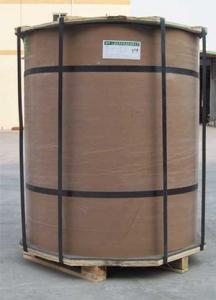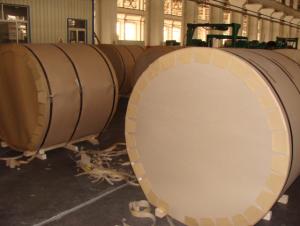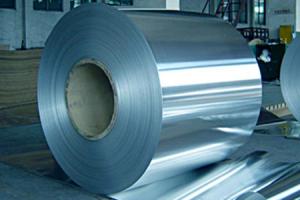Aluminum Coils Mill Finished 5XXX
- Loading Port:
- China Main Port
- Payment Terms:
- TT or LC
- Min Order Qty:
- 8 g/ft
- Supply Capability:
- 10000 g/ft/month
OKorder Service Pledge
OKorder Financial Service
You Might Also Like
1.Structure of Aluminum Coils Mill Finished 5XXX Description
Aluminum Coils Mill Finished 5XXX has great ductility, heat conductivity, anti-corrosion and moisture resistance properties.
Aluminum Coils Mill Finished 5XXX is widely used for electronics, instruments, lighting decoration, packing industry, house decoration, curtain wall, honeycomb-core panel, sandwich panel, aluminum composite panel and aluminum composite pipes.
2.Main Features of the Aluminum Coils Mill Finished 5XXX
• Superior quality of raw material
• Reasonable and stable chemical composition
• Accurate tolerance
• Goode mechanical property
3.Aluminum Coils Mill Finished 5XXX Images
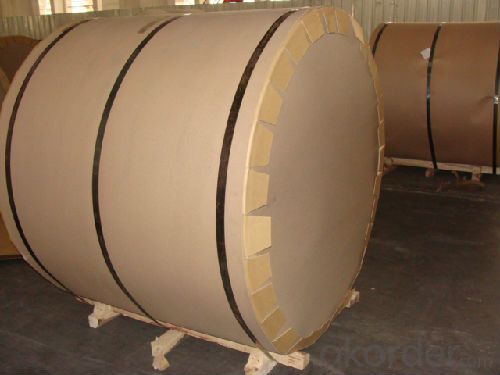
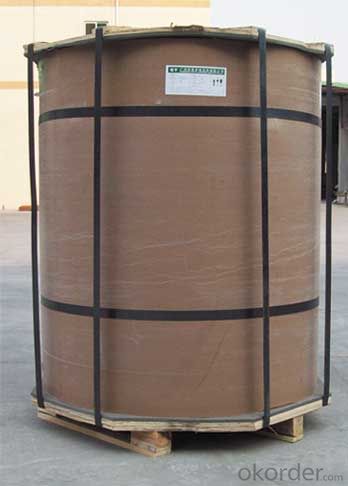
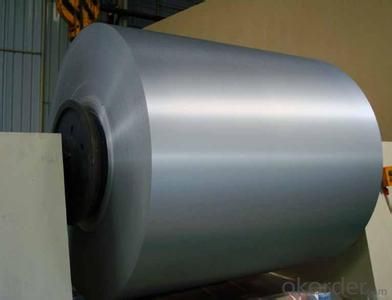
4.Aluminum Coils Mill Finished 5XXX Specification
| Alloy | AA5xxx (AA5052,AA5083,AA5754 etc) |
| Temper | H14,H16,H18,H22,H24,H26,H32,O/F |
| Thickness | 0.2mm--100mm |
| Width | 30mm--1700mm |
| Standard | GB/T 3880-2006 |
5. FAQ of Aluminum Coils Mill Finished 5XXX
A.How to guarantee the quality?
Customers are welcome to our mill to visit and check the products. Besides, we can arrange a third party to test Aluminum Coils Mill Finished 5XXX products.
B.What is the MOQ?
The MOQ for each size is 8 tons.
- Q:Are there any restrictions on the coil length of aluminum coils?
- Yes, there are restrictions on the coil length of aluminum coils. The maximum coil length is typically determined by the capabilities of the equipment used for coil production and handling. Factors such as the size and capacity of coil winding machines, transportation and storage limitations, and the weight and stability of the coil itself all play a role in determining the maximum coil length. Additionally, longer coils may be more prone to handling and logistical issues, such as increased risk of damage during transportation or difficulties in uncoiling and processing. Therefore, it is important to consider these restrictions and limitations when determining the appropriate coil length for aluminum coils.
- Q:Are aluminum coils suitable for air conditioning systems?
- Yes, aluminum coils are suitable for air conditioning systems. Aluminum coils offer excellent heat transfer properties, durability, and resistance to corrosion, making them a popular choice in air conditioning systems. They are lightweight, efficient, and can withstand high-pressure applications, making them a reliable option for cooling and refrigeration purposes.
- Q:How are aluminum coils inspected for quality?
- Aluminum coils are inspected for quality through a series of rigorous tests and inspections. These inspections are crucial to ensure that the coils meet the required industry standards and specifications. One common method used to inspect aluminum coils is visual inspection. Trained inspectors visually examine the coils for any visible defects such as surface scratches, dents, or any other physical imperfections that may affect the quality of the coil. This inspection is typically done using specialized lighting and magnification equipment to ensure thorough examination. Another important inspection method is dimensional inspection. In this process, the dimensions of the aluminum coils are measured and compared against the specified tolerances. This helps ensure that the coils meet the required size and shape requirements. Coating inspection is also an essential part of the quality inspection process. The coating on aluminum coils is inspected for uniformity, adhesion, and thickness. Specialized instruments are used to measure the coating thickness and ensure that it meets the specified requirements. Additionally, mechanical properties such as tensile strength, yield strength, and elongation are tested to assess the strength and durability of the aluminum coils. These tests involve subjecting samples from the coils to controlled stress and measuring their response. Lastly, various non-destructive testing techniques are employed to detect any hidden defects or flaws that may not be visible to the naked eye. These techniques include ultrasonic testing, eddy current testing, and dye penetrant testing. These methods help identify any internal defects such as cracks or voids that could compromise the quality of the aluminum coils. Overall, a combination of visual inspections, dimensional measurements, coating inspections, mechanical property testing, and non-destructive testing techniques are employed to thoroughly inspect aluminum coils and ensure their quality before they are deemed suitable for use in various industries such as construction, automotive, and aerospace.
- Q:What are the different yield strengths of aluminum coils?
- The yield strength of aluminum coils can vary depending on the grade or alloy of aluminum used. Aluminum is available in various grades, such as 1100, 3003, 5052, and 6061, among others. Each grade has its own unique properties, including different yield strengths. For instance, the 1100 grade of aluminum has a relatively low yield strength of about 12,000 psi (pounds per square inch). This grade is often used for general-purpose applications where high strength is not a primary requirement. On the other hand, the 6061 grade of aluminum has a significantly higher yield strength of around 35,000 psi. This grade is commonly used in structural applications or where higher strength and durability are needed. It's important to note that the yield strength of aluminum coils can also be influenced by factors such as the thickness and temper of the material. Thicker coils generally have higher yield strengths, while different tempering processes can further enhance the strength and other mechanical properties of the aluminum. In summary, the yield strength of aluminum coils can vary depending on the grade, thickness, and temper of the material. It is essential to consider these factors when choosing the appropriate aluminum coil for specific applications to ensure optimal performance and structural integrity.
- Q:What are the common applications of aluminum coils in the aerospace industry?
- Aluminum coils are commonly used in the aerospace industry for various applications such as constructing aircraft frames, manufacturing wings, building fuselages, and designing engine components. The lightweight yet strong nature of aluminum makes it an ideal choice for these purposes, as it helps reduce overall aircraft weight, enhance fuel efficiency, and improve performance. Additionally, aluminum's corrosion resistance properties play a crucial role in ensuring the longevity and durability of aerospace structures.
- Q:Can aluminum coils be used in wastewater treatment plants?
- Yes, aluminum coils can be used in wastewater treatment plants. Aluminum coils are commonly used in heat exchangers within wastewater treatment plants to transfer heat effectively and efficiently. They are resistant to corrosion and can withstand the harsh environment of wastewater treatment processes.
- Q:Can aluminum coils be used in architectural mesh applications?
- Yes, aluminum coils can be used in architectural mesh applications. Aluminum is a versatile and lightweight material that is commonly used in construction and architectural projects. It offers numerous benefits for architectural mesh applications including high strength-to-weight ratio, corrosion resistance, and ease of installation. Aluminum coils can be formed and fabricated into various shapes and sizes to create intricate architectural mesh designs. The coils can be woven, welded, or expanded to create different patterns and textures, allowing for flexibility in design and customization. Architectural mesh applications using aluminum coils can be found in a wide range of structures such as facades, partitions, ceilings, sunscreens, and safety barriers. The mesh can provide aesthetic appeal, privacy, sun shading, ventilation, and even security. In addition to its aesthetic and functional qualities, aluminum is also a sustainable choice for architectural mesh applications. It is a highly recyclable material, and its lightweight nature reduces transportation and installation costs, making it an environmentally friendly option. Overall, aluminum coils are an excellent choice for architectural mesh applications due to their durability, versatility, and sustainability. Whether it is for commercial, residential, or public spaces, aluminum mesh can enhance the visual appeal and functionality of architectural designs.
- Q:Can aluminum coils be formed or shaped?
- Certainly, aluminum coils have the capability to undergo formation and shaping. Aluminum, being an extremely pliable metal, can effortlessly be molded or bent into diverse configurations without experiencing any fractures or breaks. Aluminum coils frequently find usage in numerous applications including the production of heat exchangers, condenser coils, evaporator coils, and air conditioning systems. These coils can be transformed into various structures such as flat sheets, tubes, or finned coils, catering to the specific demands of the intended purpose. The adaptability and formability of aluminum coils render them exceptionally versatile and extensively employed across multiple industries.
- Q:Can aluminum coils be used in aerospace applications?
- Yes, aluminum coils can be used in aerospace applications. Aluminum is a lightweight and durable material that offers excellent heat conductivity and corrosion resistance, making it suitable for various aerospace components like heat exchangers, condensers, and cooling systems. Its versatility and strength-to-weight ratio make aluminum coils a popular choice in the aerospace industry.
- Q:What are the acoustic properties of buildings using aluminum coils?
- Various factors can influence the acoustic properties of buildings that utilize aluminum coils. These coils are commonly employed in the construction industry for purposes such as roofing, cladding, and insulation. In terms of acoustics, these properties can have both positive and negative effects on sound transmission within a building. One of the main advantages of using aluminum coils from an acoustic standpoint is their ability to act as a barrier that reflects sound waves. When installed correctly, they can help prevent sound from penetrating walls or ceilings, resulting in a reduction of external noise sources. This can be especially beneficial in areas with significant noise pollution, such as urban environments or locations near busy roads. Additionally, aluminum coils can contribute to the overall sound insulation of a building. Due to their material properties, they can provide a certain level of soundproofing, particularly when combined with other insulation materials. This can create a comfortable and quiet indoor environment, which can lead to improved concentration, productivity, and overall well-being for occupants. However, it is important to note that the acoustic properties of buildings using aluminum coils may also have limitations. Aluminum is a lightweight material compared to alternatives like concrete or brick, meaning it may not offer as much mass to block sound transmission. Therefore, in situations where high sound insulation is necessary, additional measures such as double glazing, acoustic seals, or thicker wall constructions may be required. Furthermore, the use of aluminum coils can also impact the sound reverberation within a space. Their smooth and reflective surface can cause sound waves to bounce off, resulting in increased echo and reverberation time. This can have a negative effect on speech intelligibility and acoustic comfort, particularly in larger open-plan areas or rooms with high ceilings. Overall, while aluminum coils can provide certain acoustic benefits such as sound reflection and insulation, it is crucial to consider the specific requirements of each building project. Consulting with acoustic engineers or professionals can help ensure that appropriate measures are taken to optimize the acoustic properties of buildings utilizing aluminum coils and address any potential limitations.
1. Manufacturer Overview |
|
|---|---|
| Location | |
| Year Established | |
| Annual Output Value | |
| Main Markets | |
| Company Certifications | |
2. Manufacturer Certificates |
|
|---|---|
| a) Certification Name | |
| Range | |
| Reference | |
| Validity Period | |
3. Manufacturer Capability |
|
|---|---|
| a)Trade Capacity | |
| Nearest Port | |
| Export Percentage | |
| No.of Employees in Trade Department | |
| Language Spoken: | |
| b)Factory Information | |
| Factory Size: | |
| No. of Production Lines | |
| Contract Manufacturing | |
| Product Price Range | |
Send your message to us
Aluminum Coils Mill Finished 5XXX
- Loading Port:
- China Main Port
- Payment Terms:
- TT or LC
- Min Order Qty:
- 8 g/ft
- Supply Capability:
- 10000 g/ft/month
OKorder Service Pledge
OKorder Financial Service
Similar products
New products
Hot products
Related keywords
